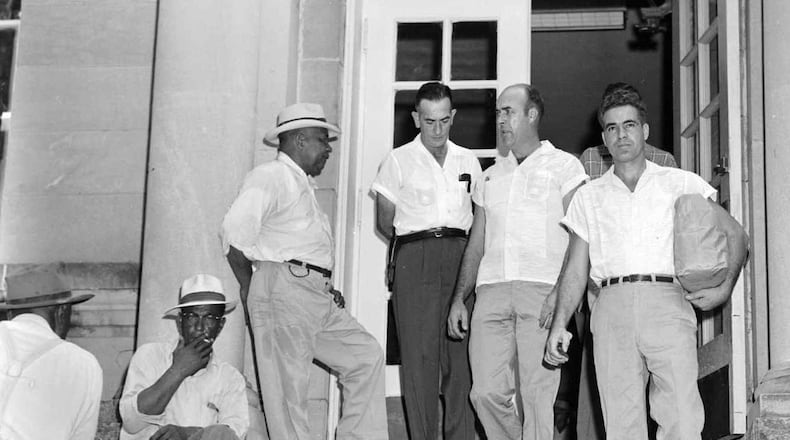Deborah Watts heard the whispers that her cousin,"Bobo"was missing in Mississippi.
It was late August 1955. A few days later, Watts, then a toddler, remembers her relatives crying and their unbearable sadness when his body was found in the Tallahatchie River in the Mississippi Delta. Her cousin was Emmett Till, who was 14 when he was accused of flirting with a white woman while visiting relatives down South.
The woman’s husband and his half-brother hunted down Till, beat him, gouged out his eye, shot him and tossed his broken body, wrapped in barbed wire and weighed down by a 75-pound cotton gin fan, in the river.
"This was a tragedy — the shock of it, the lack of humanity — that was shared by the world," said Watts, co-founder of the Minneapolis-based Emmett Till Legacy Foundation, which was formed in 2005 to preserve the legacy and honor the memory of Till and his mother, Mamie Till Mobley, who spent the rest of her life seeking justice and speaking out about the murder.
His death helped launch the civil rights movement.
Now, that painful wound has been ripped open again following revelations in a new book, "The Blood of Emmett Till," in which the teen's then 21-year-old accuser admits she lied about Till making physical and verbal advances.
North Carolina historian and author Timothy B. Tyson said Carolyn Bryant Donham, who is now in her 80s and lives in North Carolina, told him that her testimony that Till grabbed her hand and waist was a fabrication. He also whistled at her outside.
The men were acquitted of his murder, but later admitted to a magazine that they had killed him.
“There are so many unanswered questions,” said Watts, a former marketing executive who lives in Minneapolis but visits metro Atlanta frequently. She often speaks around the nation about the foundation and Till. “I hope she continues to tell the truth. This miscarriage of justice is something that we have always lived with. We’re not bitter but I believe there is an opportunity for the authorities to look closer at her revelations and if there’s a possibly for prosecution, they should pursue it.”
Another cousin, the Rev. Wheeler Parker, 77, who lived next door to Emmett, called it an answer to a prayer. He was there when Till whistled at Bryant Donham outside the store. He never saw Till touch the woman.
He said he suffered for years because “Emmett was put in a bad light (allegations that he touched her). When you love someone and lies are told on them, that hurts tremendously.”
But he doesn’t hate Bryant Donham, because “I can’t afford to hate, because hate destroys the hater,” said Parker. “Most cold cases are never solved, but they don’t get past God. From my personal experience, I know you reap what you sow.”
He said Bryant Donham will as well. “She doesn’t get by either,” he said, although he doesn’t necessarily want to see her go to jail. “If they give her immunity and she tells the truth, I’d go for that.”
The admission is significant because "this was an egregious violation of his (Till's) rights and his life," said Paula C. Johnson, co-director of the Cold Case Justice Initiative at Syracuse University College of Law, which has studied the case extensively. "Sixty-two years later, we need to correct the historical record, if not in the court of law, certainly in the public courts."
She said Bryant’s confession shows much more needs to be investigated in the case on the state and federal levels.
“This is not to be taken lightly,” she said. “It gives the authorities another opportunity to get to the bottom of what happened. There may be more information. Maybe others who were involved. “
The family and the public has a right to know the “unvarnished truth.”
Interest in the case is not likely to die down anytime soon.
According to Vanity Fair, at least three film or mini-series projects are slated to come out on Till's case, including a six-part HBO series that includes Will Smith, Jay-Z and Casey Affleck as executive producers. That project is based on Devery Anderson's 2016 biography, "Emmett Till: The Murder that Shocked the World and Propelled the Civil Rights Movement." Director and writer Steven Caple Jr. has signed on to pen the script.
As for Watts, she doesn’t think it’s too late to prosecute Bryant Donham.
“If authorities have evidence,” she said. ” I would hope that she pays for this, regardless of race, age or religion. If you break the law you need to pay. If you were responsible and had any role in Emmett’s death, you should pay for the crime. I don’t care if she’s 100. Emmett was 14 at the time and it was a horrific death. He had to pay with his blood.”
About the Author
Keep Reading
The Latest
Featured


